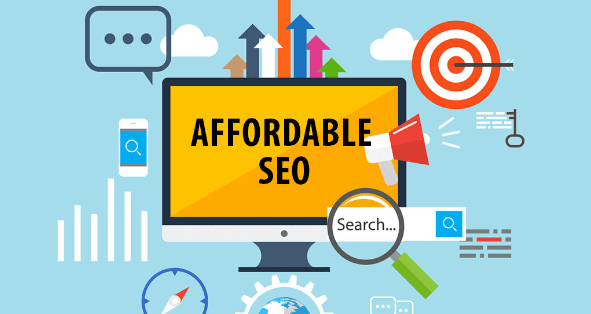The Beginner’s Guide to Affordable SEO Packages for Startups

Current economic challenges such as inflation, skills shortages, and general economic uncertainty represent a major burden, particularly for small and medium-sized enterprises (SMEs). Every expense, especially in marketing and online presence, must be carefully considered. In this difficult environment, search engine optimization (SEO) is an effective strategy to improve visibility and increase sales. However, until now, professional SEO has often been too expensive for many SMEs. However, Affordable SEO Packages for Startups still offer professional help to small businesses.
Understand the importance of SEO pricing for startups
Why is SEO pricing important for startups?
- Visibility and organic traffic: SEO is not just a tool; it’s the compass that guides potential customers to your startup’s doorstep. It’s akin to securing a prime location in a bustling market, opening up endless possibilities for growth and success.
- Cost-effective long-term investment: Although the upfront costs may seem daunting, consider SEO as a long-term investment. It pays off over time.
- Competing with established players: Startups often compete with industry giants. Effective SEO levels the playing field.
- Build brand authority: SEO is not just about keywords; It’s about building authority and credibility.
- Target the right audience: SEO enables precise audience targeting based on demographics, behavior, and intent.
The Practical Considerations – Allocating Your SEO Budget
Let’s look at practical budget allocation considerations:
Keyword research and analysis:
- Conduct keyword research to identify relevant terms related to your startup’s products or services.
- Invest in tools like Ahrefs or SEMrush to analyze search volume, competition, and user intent.
On-page optimization:
- Optimize your website structure, meta tags, headings, and content.
- Ensure mobile responsiveness, fast loading times, and user-friendly navigation.
- Example: Create compelling meta descriptions that entice users to click on your pages.
Content creation and promotion:
- Develop high-quality, relevant content that addresses user needs.
- Invest in blog posts, infographics, videos, and case studies.
- Promote your content via social media, email newsletters, and influencer collaborations.
Link building and reach:
- Acquire authoritative backlinks to increase your website’s credibility.
Technical SEO and maintenance:
- Regularly check your website for technical issues (e.g., broken links, crawl errors, duplicate content).
- Implement schema markup, optimize images, and improve website speed.
Define goals for your SEO spending
Setting goals and defining targets for your SEO spending is a crucial aspect of effectively managing your startup’s SEO budget. By setting clear goals, you can align your SEO efforts with your business goals and maximize return on investment.
1. Align SEO Goals with Business Goals:
When setting goals for your SEO spending, it’s important to align them with your overall business goals. For example, if your startup aims to increase brand visibility and increase organic traffic, your SEO goals may focus on improving search engine rankings, optimizing website content, and improving user experience.
2. increase in organic traffic :
A common goal with SEO spending is to increase organic traffic to your website. By optimizing your website’s on-page elements, such as meta tags, headings, and keyword usage, you can improve search engine visibility and attract more organic visitors. Additionally, creating high-quality content that speaks to your audience’s needs and interests can help increase organic traffic .
3. Improve search engine rankings :
Another goal of SEO spending is to improve your website’s search engine ranking. This includes optimizing the technical aspects of your website, such as examples, site speed, mobile-friendliness, and crawlability. Additionally, conducting keyword research and implementing an effective backlink strategy can contribute to higher search engine rankings.
4. Improving User Experience:
User experience plays a crucial role in SEO success. By focusing on improving site usability, navigation, and page load times, you can improve the overall user experience and increase engagement metrics such as time on site and bounce rate. This in turn, can have a positive effect on your search engine ranking.
5. Target specific keywords:
If your startup operates in a niche market or offers specialized products or services, targeting specific keywords can be a valuable SEO goal. By conducting thorough keyword research and optimizing your website content for those keywords, you can attract highly relevant traffic and increase the likelihood of conversions.
6. Performance monitoring and analysis:
Setting goals for SEO spending also includes monitoring and analyzing performance metrics. By regularly tracking key performance indicators (KPIs) such as organic traffic, search engine rankings, conversion rates, and engagement metrics, you can evaluate the effectiveness of your SEO efforts and make data-driven optimizations.
Remember, these are just a few goals you can set for your SEO spending. The specific goals and strategies vary depending on the individual needs and goals of your startup. By carefully defining your goals and regularly evaluating your SEO performance, you can effectively allocate and manage your SEO spending for long-term success.
Conclusion
If you are an entrepreneur struggling with organic traffic and growth, SEO is the ultimate solution for the long term. However, affordability is something that needs to be cracked. It isn’t tough, but you must be considerate and look out. You can find a number of SEO Consulting Services to help you with your queries professionally.




